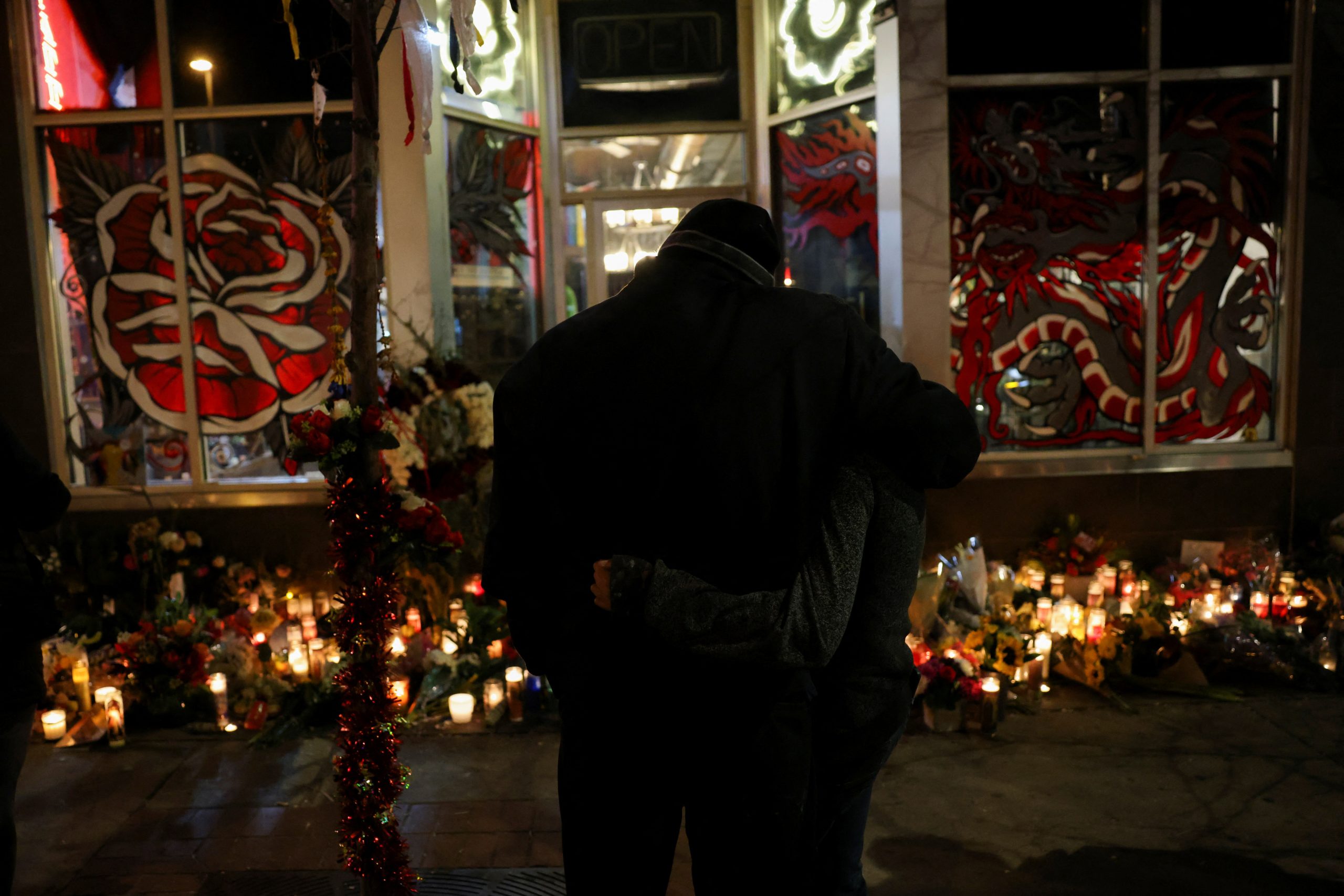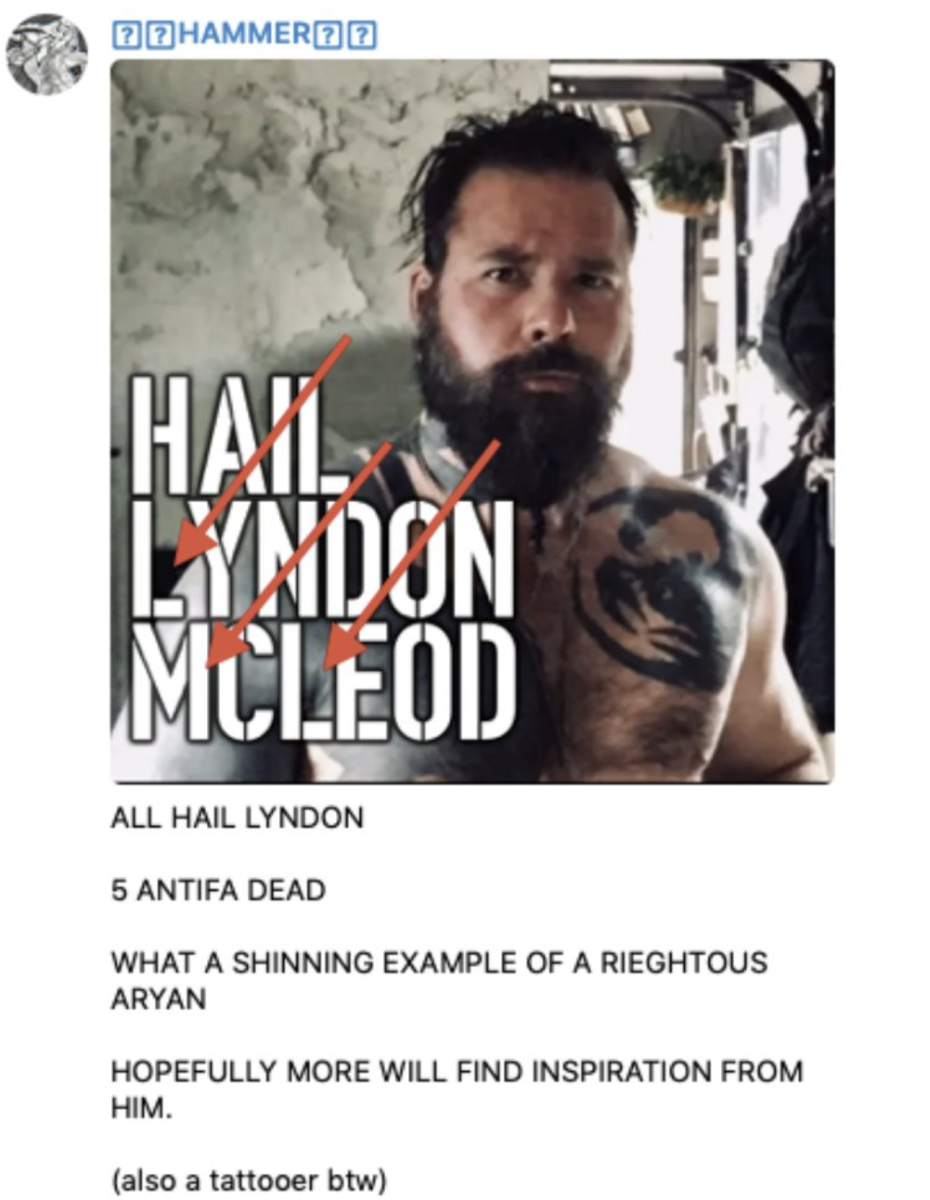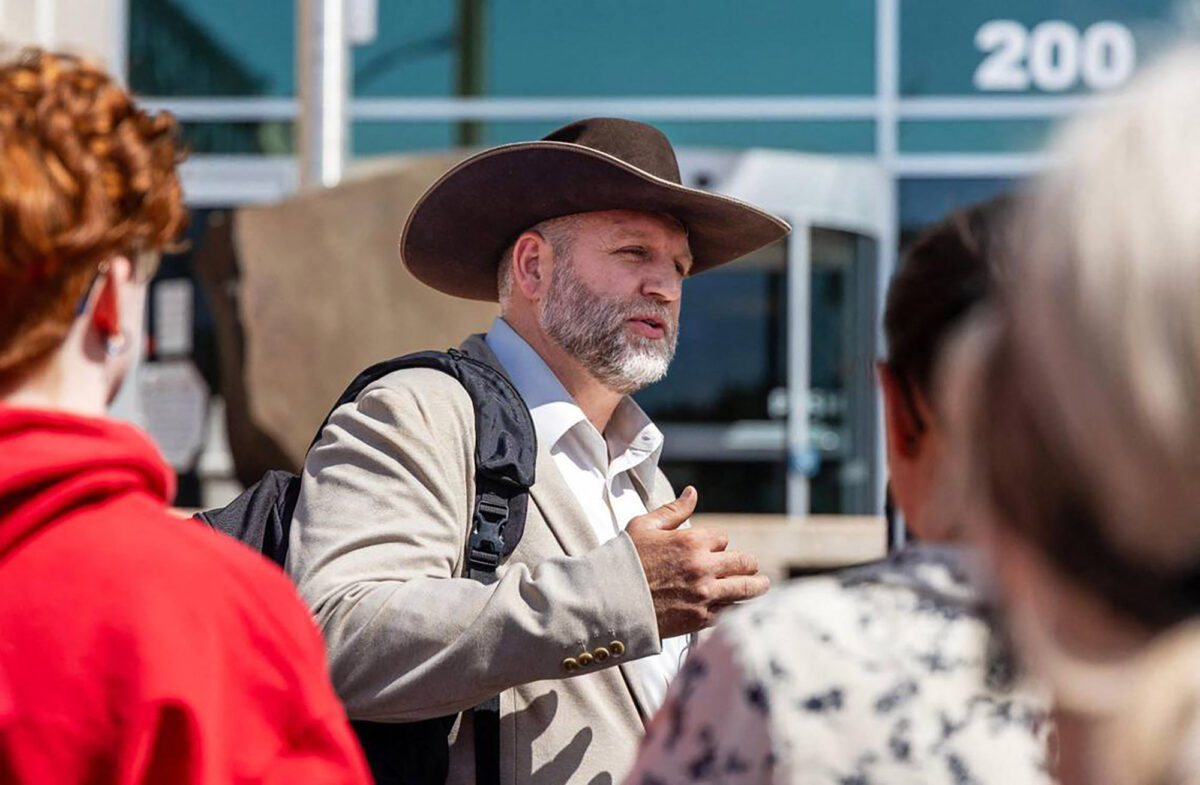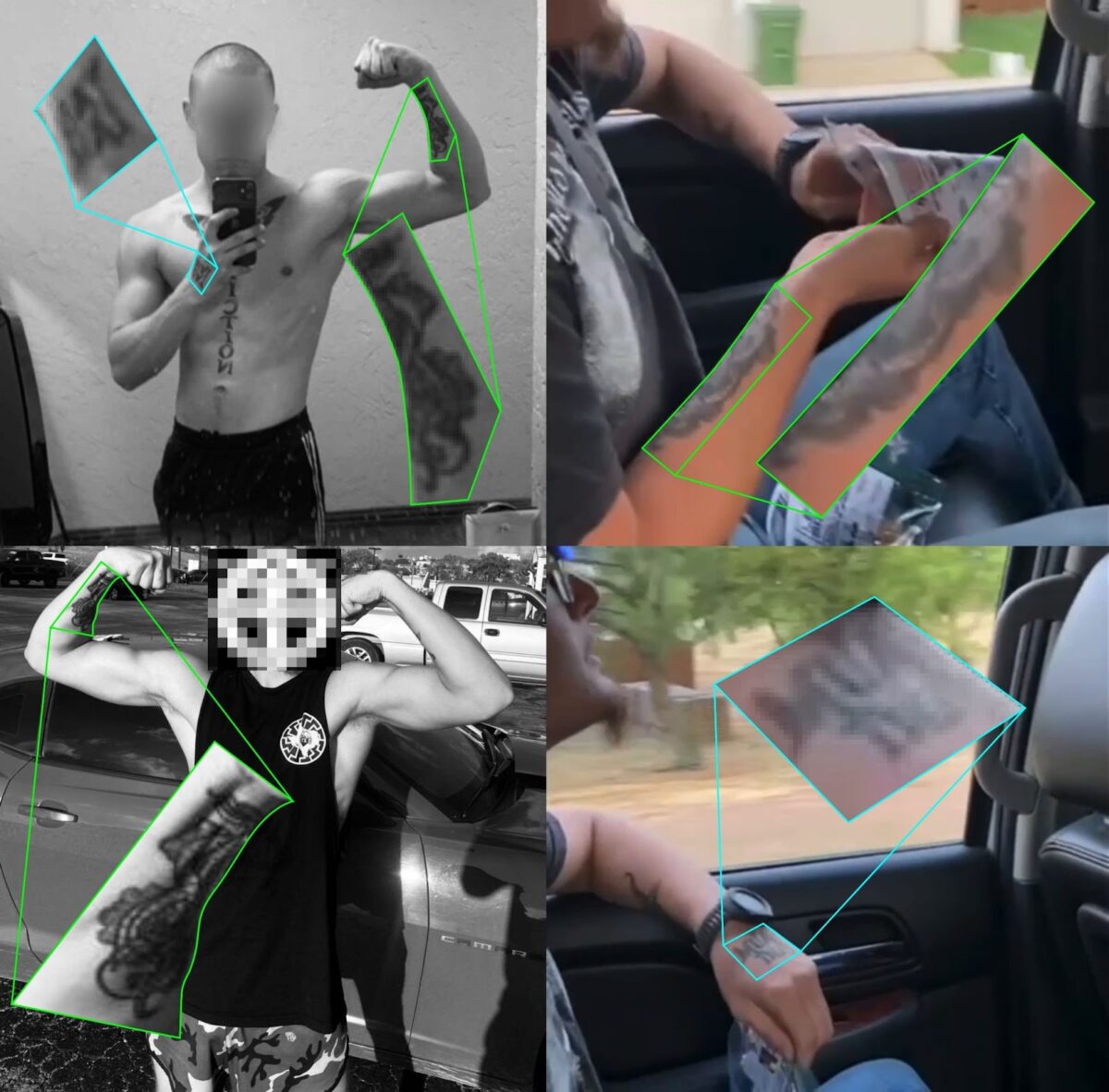How the Denver Shooter’s Digital Trail Exposes the Violent Fantasies of the ‘Manosphere’
As evening fell on December 28 in Denver, Colorado, a gunman identified by police as Lyndon McLeod burst into Sol Tribe Tattoo and Piercing and shot dead Alicia Cardenas and Alyssa Gunn-Maldonado, injuring another man on the scene. He proceeded about three miles to an apartment complex, where he murdered his former associate, Michael Swinyard, continuing his rampage to his own former tattoo parlour. After a brief firefight with police, McLeod raced to Lucky 13 Tattoo, where he killed Danny Scofield, engaging in another shootout with police before retreating on foot into a Hyatt hotel and murdering a 28 year-old clerk named Sarah Steck, meeting his death in a third, final melee with police.
The shooter’s choice of targets was deliberate, according to law enforcement, and related to the business he was connected to until 2017, All Heart Industry (also called Flat Black Ink). Denver police have also confirmed that McLeod knew at least four of the five victims.
In the wake of this tragedy, a profile has emerged of the killer’s life as a far-right ideologue popular in the notoriously misogynistic corner of the internet known as “the Manosphere”.
Crucially, as has been widely reported, this presence included a self-published, self-valorising series of books in which the shooter described a massacre at a tattoo parlour on the very same Denver street.
These novels, until recently available online, are just one part of a digital trail linking the shooter to fringe pagan and esoteric groups. Upon closer examination, the image of a “lone wolf” begins to dissolve and a far right, masculinist vision of mass shootings as a form of cathartic violence comes into relief.

People create a memorial of candles and flowers outside the tattoo shop where owner Alicia Cardenas was killed Monday during a shooting spree in Denver, Colorado, U.S., December 29, 2021. Photo (c): Reuters/Kevin Mohatt
Entering the Far-Right Canon
Far-right mass shootings are an increasingly international phenomenon. Although many killers act alone, they manifest similar ideologies through attacks that build on and take inspiration from one another. The Christchurch shooting in 2019 inspired the El Paso and Poway shooters, along with the Hanau shootings and the Norway mosque attack in 2020. And while the Denver shooter did not explicitly mention the perpetrators of those heinous attacks, his ideology bears many of the same characteristic traits.
He also promoted violent accelerationist groups like the Boogaloo Boys, who believe in heightening the tensions within modern civilisation in order to expedite its inexorable collapse.
The shooter’s aforementioned lengthy fiction trilogy, Sanction is listed among the “essential canon” of screeds by the “Manosphere” website Renaissance of Men. It reads like a manifesto for a cultish mixture of white nationalism, pagan mythologies, self-help individualism, and neo-völkisch tribalism associated with obscure masculinist groups like the Wolves of Vinland and Operation Werewolf. Indeed, according to one fan who warned Denver police in early 2021 after growing concerned about McLeod’s chat posts and fascist book, “Though the book is not political per se, it could be read as an extremist right-wing manifesto and a terrorist prophecy.”
Sanction was available for purchase on Amazon, though it was reportedly removed on December 29.
Written under the pseudonym “Roman McClay,” Sanction leans heavily on right-wing tropes about the “noble savage,” the “strong men” as understood by Nietzsche, and the need to shed civilization’s constraints in order to attain a more “complete, integrated” form of humanity, like a barbarian, or what he calls, “Homo Barbarianus.” Its main character, conveniently named “Lyndon MacLeod,” goes on a killing spree at a tattoo parlour.
During one podcast appearance in November 2019, McLeod made it clear that writing the book was “Plan B” — a “creative” way to express his rage at those he felt had betrayed him. A “Plan B” also surfaces in Sanction, though here the main character discusses violent retribution against the characters who have cheated him. The book even marks the addresses of future targets and names of future victims among the characters murdered by his eponymous protagonist. Michael Swinyard, whom McLeod’s protagonist calls his “business partner,” is accused of cheating him in Sanction.
In a detailed scene chillingly close to the actual event, McLeod’s character stalks Swinyard to his apartment dressed in a police uniform and meticulously carries out his execution. In the second volume of Sanction, McLeod’s character admits to murdering Alicia Cardenas, by name.
The murderer’s alter-ego “MacLeod” is described in Sanction as a 40-something celibate man disillusioned with the world. “He owned a tattoo shop and he hated the whole industry,” the book’s narrator discloses.
A parallel series of murders that takes place in the book’s first volume targets several percieved ideological and political enemies who are prominent in US public life. Its character learns his victims’ addresses from the fascist-infested image board, 8chan, also associated with the far-right killings in Christchurch, Poway, and El Paso.
But Sanction is not just a revenge fantasy that deploys a typical blueprint for hate killings — it’s a political diatribe which supports wholesale slaughter under the banner of white supremacy.
The best way of destroying the modern decadence of vice, absence of pain and loose morals, Sanction suggests, is extreme violence including murder. And since the author views the guilty as a tableau of personal and political actors accountable for the modern world, certain targets become more appealing based on his relationship to them.
Characters in Sanction sound off against abortion, Jews, and anti-racist activists, ridiculing a supposed loss of masculinity in the modern world.
Outside of the context of the book, the author had argued that humans need pain and suffering to thrive, saying in a now-removed podcast interview about the book that “we may benefit from suffering more than we know…I think people may cut off suffering earlier than they should.”
Many of the ideas posed in Sanction are shared by other mass shooters, whose manifestos further inspired fascist hate. Like the Christchurch and El Paso shooters, the Denver shooter promoted ecofascist ideas on modernity and immigration, along with anti-Semitic views about the media, and vague anti-imperialist notions that ultimately favour a paradoxical form of authoritarian libertarianism.
And the Denver shooter’s acts soon garnered praise from other far-right extremists. A fascist group that lionises mass shooters with a “Saint Calendar” altered their 2022 calendar to include McLeod as a newly-minted “saint” of the fascist movement alongside the Christchurch, Norway, Hanau, Poway, and El Paso shooters. Meanwhile, a Telegram channel called the Hammer, reportedly run by a man named Chris Pohlhaus, exhorted its followers to “Hail Lyndon McLeod,” and called on others to “find inspiration from him” and his “shining example of a rieghtous [sic] Aryan.”

A post by the Telegram channel known as ‘The Hammer’ glorifying the Denver shooter
Operation Werewolf
The Denver shooter emerged from a world of online cultic grifters, esotericists, and masculinist weight lifting gurus who have built up a large following of disaffected men looking to reclaim some mythic image of their own masculinity. Sanction is well centred in this tradition of literature, particularly that reflected by Operation Werewolf and its parent organisation, the Wolves of Vinland.
The Wolves of Vinland have been described by the Southern Poverty Law Center as a “a tribe of heathens, who worship a particularly Germanic strain of Wotanism, despise the modern world, and are invested in an anti-equality worldview.” They were founded by a white nationalist named Paul Waggener, and seek to mix white supremacist interpretations of Norse paganism with the structure and attitude of a biker gang.
Separately, Waggener has created a series of books, webzines, clothing, strength training regiments and even supplements. His Operation Werewolf brand had an “elite” program where men could learn how to train and worship like Waggener and to form groups of their own similar to the Wolves of Vinland. Men paid for subscriptions to an internal forum where they got training on runic magic, weight lifting, and general self-help tools.
Waggener disbanded the Operation Werewolf brand at the end of 2020, closing the forum and website in early 2021, but he rebranded it into an array of podcasts, Facebook groups, and publishing projects, all of which maintain the same perspective.
However, the authors of this article were able to archive the entirety of the closed forum’s content, including nearly five years’ worth of posts. The name of Roman McClay, the pseudonymous author of McLeod’s book ‘Sanction’ receives several mentions in the forum.
Despite sharing a spiritualist rejection of civilisation as a manifestation of the crisis of the modern world, these posts also featured conversations about economic forays into high-risk stock trading. One sub-group named the War Room combined content about strength and weapons training with aggressive investment to create what they describe as “a global network in which exemplars of individualism work to free the modern man from socially induced incarceration.”
In a post dated March 6, 2020, one forum member reveals their admiration for the author, declaring, “My friend Roman McClay, author of Sanction, said that [Operation Werewolf] and the War Room are the only two of the kind he takes very seriously. He has also encouraged that I form closer ties with the War Room guys.”
Another Operation Werewolf post about a bacteria metaphor in Sanction reveals the series’ popularity among members: “you should definitely check out Roman McClay’s book Sanction […] bacteria plays a huge role in the book, many parts of the plot are a critique of things that are actually happening in the world.”

An archived post from the now deleted Wolves of Vinland forum in which a member praises the ‘Sanction’ book series
‘McClay’ showed an admiration for Paul Waggener, his brother, Matthias, and their former associate Jack Donovan — despite both Paul Waggener and Donovan later posting statements condemning the Denver shooting.
Paul Waggener also stated that one of the victims was known to the Wolves of Vinland.
‘McClay’ cited both Waggener brothers in ‘Sanction’ and opened the book with an epigram from Donovan.
Donovan, who according to his website now resides in Utah, joined the Wolves of Vinland in 2014. He spoke at alt-right conferences such as those put on by the National Policy Institute in 2017 and at the “race realist” conference American Renaissance. As the authors of this article have previously reported, Donovan became a visible figure on the emerging alt-right, providing a unique voice as an “androphile” (his term for a gay man) who offered an ideology based on anti-feminism, authoritarian politics, and ethnic tribalism.
In early March 2020, McLeod appeared on Jack Donovan’s podcast Start the World, but that episode was deleted after the news of the Denver shooting came to light. Some of that audio was later leaked, where he talked about finding Donovan’s work, among others, and that he “benefited quite a bit from the groundwork you guys have laid.” He goes on to say that he wanted to give a pathway to men who felt like they were more “genetically” violent than the modern culture allows and wants to create a subculture for those men in the model that Donovan created.
In a blog post about the interview with Donovan, McLeod praised him, saying “Jack Donovan was a big influence on Sanction precisely because I saw in him what I saw in myself and the men of yore and present who I admire: the slightly mad, the sagacious, the shaman not against the tribe but a bit oblique to it; the man apart. I saw him as a fellow exile.”
In a public statement posted to Instagram after the shooting, Donovan acknowledged his work with McLeod, explaining, “I never met Roman, but I interviewed him in March 2020 for a podcast after he reached out to me and several mutual contacts recommended his books.” Donovan described McLeod as “clearly very intelligent” and that his shooting was likely a response to a personal issue, but insisted, “I don’t know the facts… the whole ordeal strikes me as pointless and sad.”
Donovan added that McLeod’s ideas on masculinity were “simplistic and cartoonish,” indicating that he did not share the shooter’s worldview.
Sanction also quotes from Paul Waggener several times, with lines such as “I cannot be threatened with various sanctions; I live in the zone all the time” reproduced at the start of chapters. The Waggeners and the Wolves of Vinland also act as characters in the book (one chapter is even named “Wolves of Vinland”).

Paul Waggener and the Wolves of Vinland appear as characters in the Denver shooter’s novel series ‘Sanction’. Screenshot from the eBook version.
For example, one character is named Grimnir — the pagan pseudonym which Paul Waggener appears to have used on the Wolves’ forum. The “wise shaman” Grimnir acts as a sage during the characters’ spiritual journey.
A character named Jack Donovan appears as an interloper, having “hoodwinked” the Wolves of Vinland by finding a way to coexist with the modern world instead of enacting the “fall of the empire” as the Wolves seek to do. (Donovan dies in the book rather than simply falling out of favor with the Wolves). These passages allude to Donovan’s break with the Waggeners and the Wolves of Vinland, which resulted in Donovan eventually leaving the group to harsh criticism.
Paul Waggener posted a response to the killings on Telegram on December 29, revealing that one of the murdered is “a personal friend of a member of the Wolves [of Vinland].” Waggener disavowed McLeod’s actions and any association with him beyond being quoted in his book, lamenting, “On days like today it’s important to remember that the world can be a dark place… and it seems to be growing darker[.]”
Waggener has described the Denver shooter’s acts as anathema to his worldview. However, as the one author of this article has documented in a research paper, Neo-Nazi skinheads have used Operation Werewolf to rebrand themselves and gain supporters. Furthermore, in 2014 a Wolves of Vinland associate was sentenced to prison for attempting to burn down a historically Black church.
“I don’t know exactly where that battlefield is going to be because I don’t know how far or when and how quickly they’re going to press me,” explained Paul’s brother, Matthias Waggener, in a 2017 appearance on the white nationalist podcast Red Ice Radio. “But as we continue to back away from their world, at some point that line is going to have to be drawn to where we are defending ours.”
Thus Sanction places McLeod directly in the world of the Wolves of Vinland, its narrative serving as a discussion with the Waggeners and figures like Donovan. The structure of his worldview, his views on violence, and his spiritual ideas, appear to have been plucked from the key texts and discussions familiar to Operation Werewolf “operatives” and transmuted into this fictional novel operating as a manifesto.
His knowledge of rituals and ceremonies shared by the group, along with their internal nicknames and the specifics of their disputes — as well as his popularity on their forum and appearance on Donovan’s podcast — all point to more than just a passing relationship with the group.
Surrogate Empowerment
Such apocalyptic fantasies, which place violent men as necessary heroes against a destructive modernity, are clearly reflected in McLeod’s writings. In one pivotal section of Sanction, before committing a double murder, one of McLeod’s characters notes, “The world has drawn lines, of who was out and who was in, and the white alpha male, the working man was out.”
These kinds of ideas are also held by other far-right authors McLeod had publicly posted about, including the figure known as Bronze Age Pervert, who writes Nietzschian tracts about overcoming civilisation.

The Denver shooter Tweets an approving review of a tract by the far-right figure known as ‘Bronze Age Pervert’.
In his podcast appearances, the Denver shooter observed that there are many men just like him, feeling like they are about to break and narrating their angst through violent white supremacist fantasies.
While it seems likely that McLeod chose his targets with a personal vendetta in mind, it is plausible that a cult of masculinist violence contributed to the mentality that led to him pulling the trigger.
As McLeod said in a livestream interview he did two years ago with a manosphere stream called TheFamilyAlpha: “You don’t see the evidence of the revolution, the civil war, the violence, the murder, before it happens. You just see that act…but there were years of tension leading up to that that went into that end result. That result doesn’t just happen out of nowhere.”
As open source trails have shown with other mass shootings, there is cross-pollination and connections between even the most seemingly anodyne far-right ideologues and those who engage in gruesome acts of killing. Murder, for the shooter in Denver, became a way of feeling powerful — something which, as his alter-ego argued in Sanction, “normal civilians never get.”
As mentioned above, both Paul Waggener and Donovan disavowed any prior ties to and support for the Denver shooter in public posts on Instagram and Telegram respectively. Nevertheless, the authors reached out to both to ask directly about their views on the use of violence and whether their worldviews could have influenced McLeod’s acts.
By the time of publication, Paul Waggener had not responded to the authors’ questions. Jack Donovan responded simply: “Many people quote me, but many people also quote Buddha and that doesn’t mean that Buddha would endorse all of their actions.”


